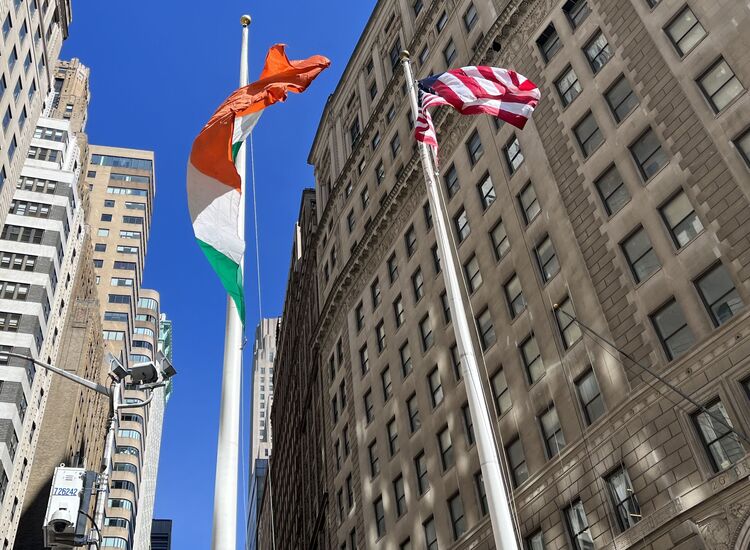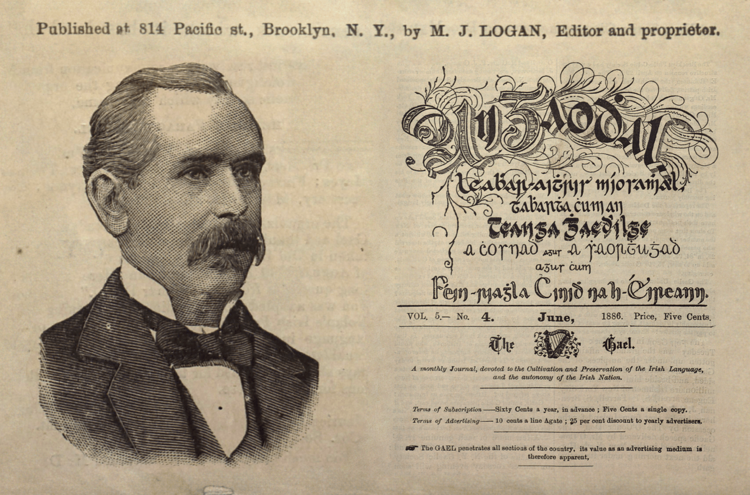Page Turner / Edited by Peter McDermott
William J. Kennedy, a Harlem-born bricklayer, was blown off of the roof of the Des Moines Coliseum and survived the five-story drop to the street. And yet that wasn’t the most noteworthy thing that happened to him in his extraordinarily eventful life. For the man who survived typhoid fever, train and car accidents, also, in the words of his great-grandnephew writer Patrick L. Kennedy, ran “to victory in the nation’s premier marathon during the scrappy early decades of the sport.”
Bricklayer Bill’s timing was perfect from a patriotic point of view – as he crossed the line in Boston wearing his stars-and-stripes bandana just a couple of weeks after the nation entered World War I.
In 2010, Patrick Kennedy – who plays piano in a trad Irish band called Tin Can Hooley – and his historian father Lawrence W. Kennedy received a typed manuscript from an elderly cousin. It was the work of Bricklayer Bill Kennedy, who hoped in later life to find a publisher for a book about about his experiences in and his thoughts about marathon running.
In vain, the Kennedys write, as “this was the mid-1960s, a decade shy of America’s modern running boom.”
It’s fitting, then, that Bill Rodgers, who won a combined eight Boston and New York Marathons between 1975 and 1980, should write a prologue to “Bricklayer Bill: The Untold Story of the Workingmen’s Boston Marathon.”
He writes: “Bill’s is a story of family and friendship and of the unique gentlemanly code of honor that has always been key to the sport.”
Rodgers adds: “It’s a powerful book” that “explores in detail the raw beginnings of marathoning, particularly in the United States.”
The Kennedys say they’ve pieced together a “story that is larger than Bill himself. It is about struggling to overcome immense obstacles, as well as about America and the way it was when a few bricklayers, plumbers and printers could be star athletes, as big as Babe Ruth, at least for a day.
Patrick Kennedy
Place of birth: Boston, Mass.
Spouse: Andrea
Children: Declan, 5, Oona Jean, 2
Residence: Brighton , Mass.
Published works: “Boston Then and Now” (Pavilion, 2009, 2010, 2014, 2016); and (co-authored with Lawrence W. Kennedy) “Bricklayer Bill: The Untold Story of the Workingman’s Boston Marathon” (Bright Leaf, 2017)

Patrick Kennedy.
What is your writing routine? Are there ideal conditions?
I write nonfiction, so it starts with boatloads of research. Then I remember there’s a deadline and I scramble to get the actual writing done. When I was working on the book, I squatted in libraries and coffee shops, but still wrote large portions of it at home at 1 in the morning. If you read it, blame all the bad puns and gratuitous alliteration on my lack-of-sleep loopiness.
What advice do you have for aspiring writers?
Read a lot, and write a lot. And if you start out by getting what seem like boring assignments, try to find the little bits of color and humanity in them. You might be surprised. Or not, but at least you got some practice.
Name three books that are memorable in terms of your reading pleasure.
I’d like to name two historical-fiction trilogies that were just a joy to read: Thomas Flanagan’s “The Year of the French” and the two following it; and Bernard Cornwell’s Arthurian trilogy, which is both grittier and funnier than you might expect of “Arthurian” fare. Seriously, if you haven’t read the latter, I envy you for having the chance to read it for the first time.
What book are you currently reading?
“The Last of the Donkey Pilgrims,” by Kevin O’Hara, who walked the length of the Irish coastline with a donkey and cart in 1979. It’s inspiring me to consider walking across Massachusetts, which seems more doable.
Is there a book you wish you had written?
I wish I had experienced and written “The Brendan Voyage,” about Tim Severin’s trip across the North Atlantic in a curragh in 1976/’77. I guess I’m all about long treks by outmoded transport in the 1970s?
Name a book that you were pleasantly surprised by.
“The Boys on the Boat,” by Daniel James Brown, about the U.S. Olympic rowing team going to Berlin in 1936. Previously, I had zero interest in or understanding of rowing, but that story blew me away.
If you could meet one author, living or dead, who would it be?
Honestly, this may sound corny, but I feel fortunate to have grown up with an author for a father: Lawrence W. (a.k.a. Larry) Kennedy’s books prior to the one we collaborated on recently were “Planning the City Upon a Hill: Boston Since 1630” (UMass Press, 1992), and an enlarged edition of Walter Muir Whitehill’s “Boston: A Topographical History” (Harvard Press, 2000).
What book changed your life?
“The Commitments” got me fired up to start a band back in the ’90s, and music has been an integral part of my life ever since. Though, if I’m being honest, I saw the movie before I read Roddy Doyle’s book.
What is your favorite spot in Ireland?
I’ve enjoyed visiting my family in Carrick-on-Shannon, but as a music guy, for favorite spot, I’ve got to go with Galway City.
You're Irish if...
you've ever argued that House of Pain belongs in the same conversation as the Beastie Boys.








